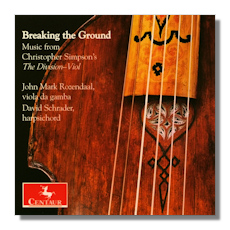
The Internet's Premier Classical Music Source
Related Links
- Latest Reviews
- More Reviews
-
By Composer
-
Collections
DVD & Blu-ray
Books
Concert Reviews
Articles/Interviews
Software
Audio
Search Amazon
Recommended Links
Site News
 CD Review
CD Review
Breaking the Ground

Music from
Christopher Simpson's "The Division-Viol"
- Christopher Simpson:
- The Division Viol :
- Divisions in D Major
- Prelude in B Flat Major
- Divisions in B Flat Major
- Divisions in D minor II
- Divisions in A minor
- Divisions in D minor I
- Prelude
- Divisions in E minor
- Divisions in G Major
- Prelude in D Major
- Richard Sumarte:
- Preludium (2)
- The Buildings
- Daphe
- Salte pitts
- Whoope dow me no harme
- Lachrymae after John Dowland
- Monsieur's Allman
- William Younge: Sarabande
- Stephen Goodall: Untitled pieces (4)
John Mark Rozendaal, viola da gamba
David Schrader, harpsichord
Centaur CRC2920
In 1659 the flamboyant "all-rounder" (performer, composer, teacher, writer, numerologist, rhetorician, theoretician and advocate) Christopher Simpson (1602?/1606?-1669) published "The Division Viol" with the aim of teaching aspiring viola da gamba players to compose extempore variations (known as "divisions") on the ground bass. As a teaching aid, "The Division Viol" is particularly well conceived… thorough, comprehensive, methodical, inspirational and expertly constructed in such a way as virtually to ensure success for the determined musician. Further, Simpson attaches the acts of composing and playing to current spiritual practices centering around the relationships believed to exist in the seventeenth century between human existence and harmony and melody.
On this welcome CD John Mark Rozendaal (viola da gamba) and David Schrader (harpsichord) have recorded a couple of dozen pieces by Simpson, Richard Sumarte (15?? - after 1630), William Younge (ca. 1610-1662) and Stephen Goodall (flourished 1660s) all to celebrate the glorious early Baroque English school of viol playing. The performers have entered fully into the spirit (not to say the technical brilliance) of the style and period. Their playing is not merely idiomatic, but in fact stylish – emphatically without being stylized. Above all the confidence and assuredness of their playing throughout suavely communicate the positive and upbeat sense of self and conviction with which Simpson's text is infused. Yet there is never any sense of overplaying or self-aggrandizement. Just a feeling that the music as conceived is sufficiently full of vigor and mettle as to be really worth hearing.
The music is varied in tone, pace and texture. More so than you might imagine. Thanks to Rozendaal's and Schrader's enthusiasm and their really supporting Simpson's intentions – that valid music-making with effecting emotional charge should result from the technicalities of the processes – there is nothing remotely perfunctory about the pieces, which are mostly short (only Simpson's Divisions in D Major [tr.1], Divisions in D minor II [tr.25], Divisions in D minor II [tr.8], Divisions in E minor [tr.18] and Sumarte's Lachrymae after John Dowland [tr.15] are longer than three minutes). Indeed, interest is maintained throughout the CD's 66 minutes. The alternation of tracks with music by the four different composers adds to the sense of richness inspired by Simpson's approach. The playing strikes a great balance between mellowness and brilliance which doesn't ever fatigue, yet is always challenging to the ear and mind. Again, one feels this is what Simpson was aiming at.
The booklet contains a broad background to Simpson's "The Division Viol", though does not always make clear how each work of all the composers fits in. The title of the CD, "Breaking the Ground" ought to be taken seriously: elaborating to great effect on the ground bass but thanks to the innate qualities of that format… repetition, insistence, the resultant harmonic progressions. And at the same time making something essentially new in doing so. This Rozendaal and Schrader bring out particularly well. They make the music not only appealing aesthetically, but exciting. Arresting. And novel without being spuriously spectacular.
The balance between restraint and flamboyance respects utterly the tone of the music. Expressiveness there is. And technical accomplishment at the same time. It may be only barely fanciful to suggest that this comes in part from the fact that the bass viol played by Rozendaal in this recording is a William Turner (Aldgate, London, 1650). Made, apparently, by assembling bent strips of wood (the "stave" method), this Turner instrument has a particularly penetrating sound. Yet not shrill. The fact that it's recorded with plenty of atmosphere and a sympathetic acoustic – albeit a concert hall, Nichols at the Music Institute of Chicago – adds to the feeling of experiment and celebration for which Simpson, writing at a time when English music was in a state of odd suspension, is famed.
Lovers of the repertoire in general will want to investigate this disc carefully. Devotees of Simpson and his "school" shouldn't hesitate. Those who want to get a feel for mid-seventeenth-century (Purcell was born in the year that "The Division Viol" was published) chamber music will not be disappointed.
Copyright © 2009 by Mark Sealey




















